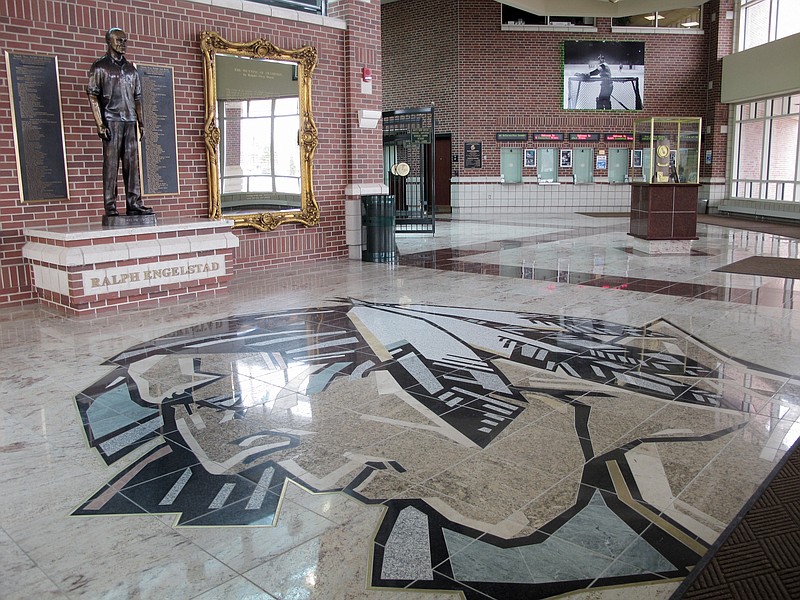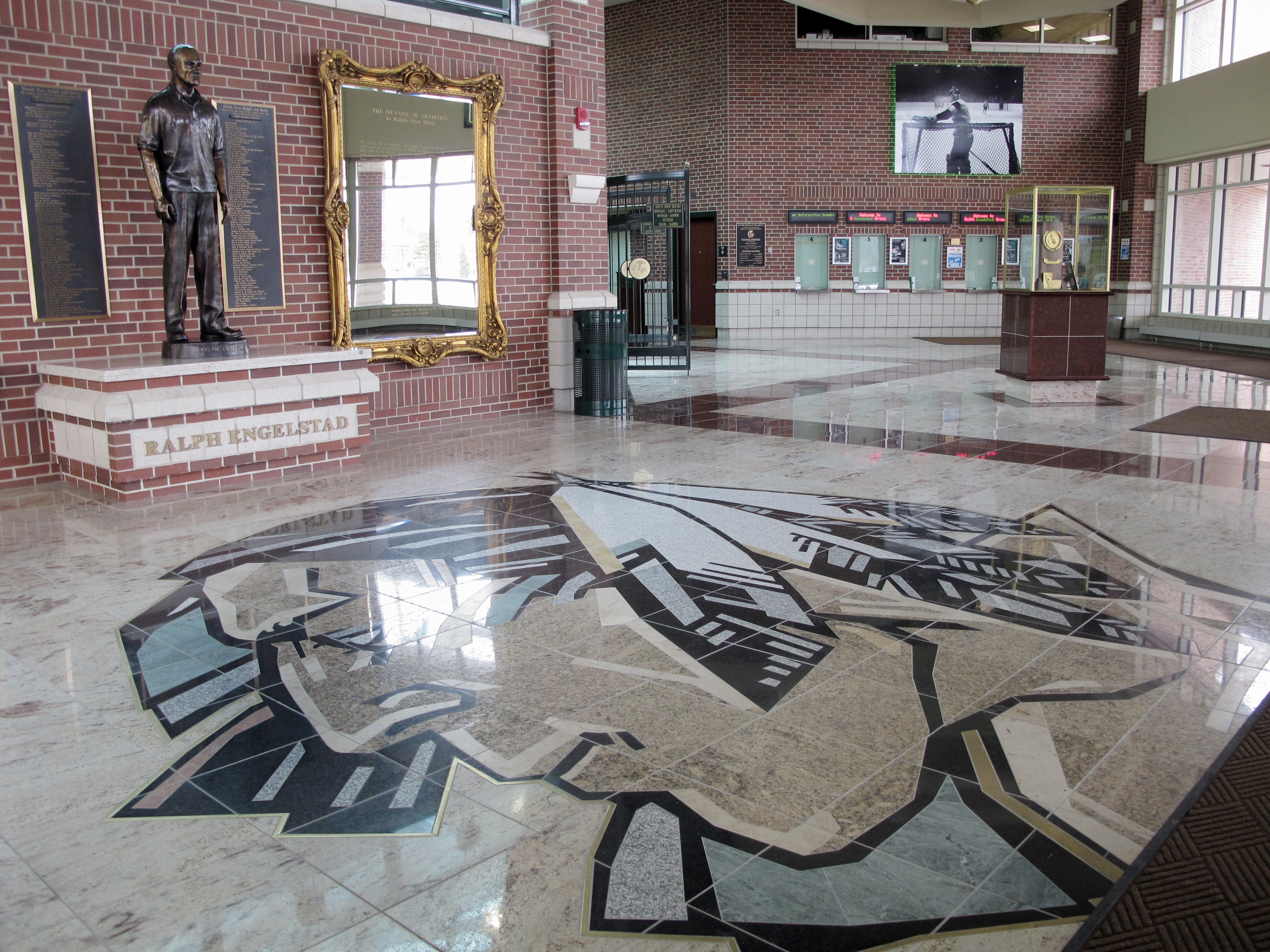By DALE WETZEL and AMBER HUNT, Associated Press
BISMARCK, N.D. - Like many of her classmates and University of North Dakota students who came before her, senior Annie Hessinger says it doesn't matter that the school is shedding its 81-year-old nickname after a drawn-out dispute with the NCAA. She's Fighting Sioux and always will be, no matter what new nickname the school eventually picks.
She'll still wear clothing bearing the Fighting Sioux logo, a colorful profile of an American Indian warrior's head. And she'll carry on school traditions that started long before she arrived, such as ending the national anthem with "home of the Sioux" instead of "home of the brave" before games.
"I've grown up going to Sioux games. My whole family has gone here," the 21-year-old graphic design major whose parents and three siblings attended UND. "It's not just the hockey team or the athletic teams. All the students here are Fighting Sioux."
Gov. Jack Dalrymple signed a law Wednesday overturning a last-ditch attempt in March by the Legislature - which counts many UND alumni among its members - to mandate that UND keep the Fighting Sioux name. That maneuvering caused scheduling headaches for UND teams and threatened its bid to join the Big Sky Conference as it transitions from Division II to Division I sports.
Since August, the NCAA has banned UND from hosting postseason tournaments and said the school's athletes may not wear uniforms with the nickname or logo during postseason play.
"Being forced to change what you're called doesn't mean changing who you are," said Democratic Sen. Mac Schneider of Grand Forks, a former UND offensive lineman. "We are the University of North Dakota, and we'll always be fighting."
The NCAA in 2005 placed UND on a list of schools American Indian nicknames, logos and mascots that if found objectionable, and UND was the last holdout on that list. Some schools were able to keep their nicknames by getting permission from the tribes. But while the Spirit Lake Sioux tribe endorsed the Fighting Sioux nickname, the Standing Rock Sioux's tribal council refused.
UND teams have been known as the Fighting Sioux since 1930. Those who support the name echo the argument made by fans of other teams with American Indian mascots - that it is part of the school's heritage and is a sign of respect that honors proud American Indian traditions.
But critics say that naming sports teams after Indians, a historically disenfranchised race of people, is demeaning and even racist.
"It's all about athletics. That's the only reason they're going along with the change," said B.J. Rainbow, 31, a UND graduate who was among a group of students in April who filed a federal lawsuit to bar the further use of Fighting Sioux imagery.
"There isn't anything about the hurt," he said.
The university has to change a lot more than mindsets. The Fighting Sioux logo and moniker appear on everything, from merchandise to the privately financed arena where the hockey teams play. The school estimates it will cost almost $750,000 to paint over, scrub out or otherwise remove old logos, order new uniforms and gear for its teams, change its stationery and update its websites.
Some remnants are likely to remain. Inside the privately owned Ralph Engelstad Arena are thousands of granite and metal Indian head logos, including one huge logo inlaid into the floor inside the building's main entrance. Jody Hodgson, the arena's manager, previously has estimated it would cost about $1 million to have most of them removed. He declined to comment when reached Wednesday.
Under the law signed Wednesday, UND can't adopt a new nickname or logo until January 2015 - a provision intended to allow the furor over the change to quiet before the university re-brands itself, officials said.
"I think we can agree that the NCAA has been frustratingly obstinate on this issue," said state Rep. Stacey Dahl, who wrote the provision. "But I assure you that it's not the NCAA who will be hurt if we do not repeal this law. It's going to be our student athletes and Division I sports at UND."
Dean Blais, who led UND to two national championships during a long tenure coaching men's hockey at the school, said UND students and alumni treat the Fighting Sioux name with reverence, and that he doesn't think they should be forced to abandon it.
"It means the world. The Fighting Sioux were exactly that. They were a proud tribe," said Blais, who now coaches at the University of Nebraska-Omaha.
He said the debate over the name was just gaining steam when he left the school in 2004.
"That was very upsetting to me, being the head coach there, knowing what the Fighting Sioux name meant to all our alumni and anyone who put on that jersey," he said. "That was a big thorn in my side when I was head coach."
North Dakota's Board of Higher Education thought it had resolved the issue in May 2009, when it voted unanimously to retire the nickname and logo. An earlier lawsuit settlement with the NCAA set an August 2011 deadline for finishing the project.
Shortly after the 2011 Legislature began in January, however, lawmakers got involved and passed the law requiring the school to keep the nickname. It was that law that was repealed Wednesday.
Duaine Espegard, the vice president of North Dakota's Board of Higher Education and a former Republican state senator from Grand Forks, said Tuesday that his view of the nickname debate has evolved since lawmakers got involved. He said "it's time to repeal the law."
"Let's move the University of North Dakota forward and get by this very divisive thing," he said.
---
Amber Hunt reported from Sioux City, S.D. AP Sports Writer Eric Olson in Omaha, Neb., contributed to this report.

